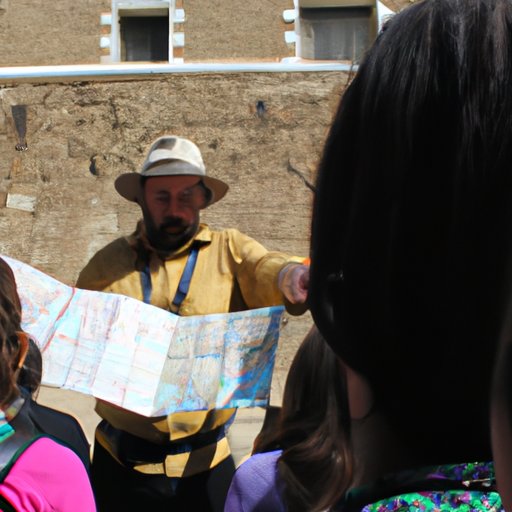Introduction
A tour guide is a person who provides information and commentary about places of interest to visitors on guided tours. They are responsible for leading groups of people through various attractions, providing interesting and informative facts along the way. Tour guides play an important role in creating memorable experiences for visitors and often serve as the face of the destination they represent.
The Role of a Tour Guide: What You Need to Know
As a tour guide, you need to be knowledgeable about the destination you are visiting, have excellent customer service skills, and be able to think quickly on your feet. Your primary role is to provide an enjoyable and educational experience for visitors. This includes providing interesting information about the sights, answering questions, and ensuring the safety of the group.
In addition to these basic duties, tour guides may also be responsible for booking accommodations and tickets for the group, offering advice on local attractions and restaurants, and handling any complaints or issues that may arise. They must also be familiar with local customs and laws, and be able to manage a group of people in a professional manner.
Qualifications and skills needed to be a successful tour guide include knowledge of the area being visited, good communication skills, flexibility and adaptability, strong organizational skills, and an ability to work independently. In some cases, a valid driver’s license may also be required.

A Day in the Life of a Tour Guide
The typical duties and activities of a tour guide can vary depending on the type of tour they are leading. For example, a walking tour of a city may involve visiting historical sites, while a bus tour of a national park may involve exploring nature trails and viewing wildlife.
In general, a tour guide’s day-to-day tasks include preparing for the tour, greeting visitors, providing information about the destination, leading the group, and answering questions. They may also be responsible for keeping track of the group’s progress and ensuring everyone stays together. Working conditions and hours vary depending on the tour, but many tour guides work long days and weekends.

Exploring the Benefits of Being a Tour Guide
One of the biggest advantages of being a tour guide is the variety of experiences it offers. As a tour guide, you will get to visit different places, meet new people, and learn about different cultures. You will also have the opportunity to explore and discover new things, and to share your knowledge with others.
Additionally, the job offers great opportunities for travel and exploration. Many tour guides get to visit exotic locations and experience unique cultures. And, if you love meeting new people, then working as a tour guide can be a great way to make friends from all over the world.

How to Become a Professional Tour Guide
Becoming a professional tour guide requires education and training. Depending on the country you live in, there may be specific qualifications or certifications you need to obtain. In some countries, such as the UK and Australia, there are courses that specialize in tour guiding. These courses cover topics such as customer service, local history, and language skills.
In addition to formal education, you may also need to obtain certification and licensing. Again, this varies depending on the country you live in. For example, in the US, tour guides may need to obtain a state-issued license or pass a test to become certified.
Common Challenges Faced by Tour Guides
One of the most common challenges faced by tour guides is dealing with difficult customers. Tour guides must be able to handle a wide range of personalities and keep the group focused and on track. They must also be able to manage disagreements between members of the group and handle any complaints or issues that may arise.
Another challenge is meeting tight deadlines. Tour guides must be able to plan ahead and stay one step ahead of the group to ensure that everyone arrives at their destination on time. This can be especially challenging when unexpected delays occur or when the group gets off track.

The Best Practices for Tour Guiding
To be successful as a tour guide, it is important to practice good preparation and research. Before each tour, you should familiarize yourself with the destination, its attractions, and any special events or activities that may be taking place. Additionally, you should be prepared to answer questions and have a backup plan in case something goes wrong.
It is also important to develop interpersonal skills. Tour guides need to be able to engage with their group and build rapport with them. This includes being friendly and approachable, listening to questions and concerns, and providing helpful advice.
The History and Evolution of Tour Guiding
The profession of tour guiding has a long and rich history. The earliest tour guides were ancient Egyptians, who acted as guides to travelers visiting the pyramids. Over time, the profession evolved to include more modern forms of transportation, such as trains and buses, as well as new technologies, such as GPS and digital maps.
Today, tour guiding is a booming industry, with tour guides leading visitors around the world. Technology has made it easier than ever for people to find and book tours, and tour guides now have access to a wealth of information and resources to help them provide the best possible experience for their guests.
Conclusion
Being a tour guide is a rewarding and exciting job that offers a variety of experiences and opportunities for travel and exploration. To become a professional tour guide, you need to have knowledge of the destination, excellent customer service skills, and the ability to think quickly on your feet. Additionally, it is important to practice good preparation and research, and to develop interpersonal skills. Finally, it is important to remember that tour guiding is a profession with a long and rich history, and that has changed and evolved over time.
(Note: Is this article not meeting your expectations? Do you have knowledge or insights to share? Unlock new opportunities and expand your reach by joining our authors team. Click Registration to join us and share your expertise with our readers.)
